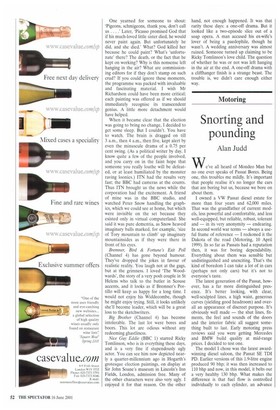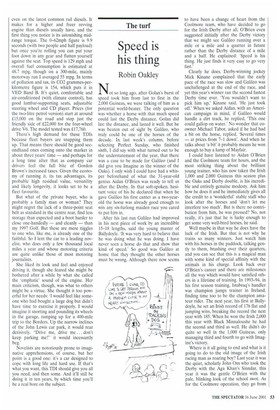Snorting and pounding
Alan Judd
We've all heard of Mondeo Man but no one ever speaks of Passat Bores. Being one, this troubles me mildly. It's important that people realise it's no longer the cars that are boring but us, because we bore on about them.
I owned a VW Passat diesel estate for more than four years and 62,000 miles, That was the grandfather of current models, less powerful and comfortable, and less well-equipped, but reliable, robust, tolerant and — in its very anonymity — endearing. In second world war terms — always a useful frame of reference — I reckoned it the Dakota of the road (Motoring, 10 April 1999). In so far as Passats had a reputation then, it was for boring dependability. Everything about them was sensible but undistinguished and unexciting. That's the kind of boredom I can take a lot of in cars (perhaps not only cars) but it's not to everyone's taste.
The latest generation of the Passat, however, has a far more distinguished presence. It's better looking, with clear, well-sculpted lines, a high waist, generous curves (yielding good headroom) and overall an appearance of discreet purpose. It's obviously well made — the shut lines, fitments, the feel and sounds of the doors and the interior fabric all suggest something built to last. Early motoring press reviews said you were getting Mercedes and BMW build quality at mid-range prices. I decided to test one.
The model I chose was the latest awardwinning diesel saloon, the Passat SE TDI PD. Earlier versions of this 1.9-litre engine produced 90 bhp; it was then increased to 110 bhp and now, in this model, it belts out a very healthy 130 bhp. What makes the difference is that fuel flow is controlled individually to each cylinder, an advance even on the latest common rail diesels. It makes for a higher and freer revving engine than diesels usually have, and the first thing you notice is its astonishing midrange torque. The 0-62mph figure is 9.9 seconds (with two people and half payload) but once you're rolling you can put your foot down in any gear and flatten yourself against the seat. Top speed is 129 mph and overall fuel consumption is estimated at 48.7 mpg, though on a 300-mile, mainly motorway run I averaged 55 mpg. In terms of pollution and tax, its CO2 grammes-perkilometre figure is 154, which puts it in VED Band B. It's quiet, comfortable and air-conditioned (with climate control), has good lumbar-supporting seats, adjustable steering wheel and CD player. Prices (for the two-litre petrol version) start at around £15,000 on the road and stop just the friendly side of £22,000 for the four-wheel drive V6. The model tested was £17,760.
There's high demand for these TDIs because fleet buyers are snapping them up. That means there should be good secondhand ones coming onto the market in about three years' time — and perhaps for a long time after that as company car drivers feel the full bite of Gordon Brown's increased taxes. Given the economy of running it, its tax advantages, its probable high residual value, versatility and likely longevity, it looks set to be a fleet favourite.
But what of the private buyer, who is probably a family man or woman? They might regret the lack of a three-point seat belt as standard in the centre rear, find less storage than expected and a boot harder to close one-handedly — and cleanly — than my 1997 Golf. But these are mere niggles to one who, like me, is already one of the faithful. So I lent the car to a leading novelist, who does only a few thousand local miles a year and whose motoring criteria are quite unlike those of most motoring journalists.
She liked its look and feel and enjoyed driving it, though she feared she might be bothered after a while by what she called the 'emphatic' sound of the engine. Her main criticism, though, was what to others might be a virtue. She thought it too powerful for her needs: 'I would feel like someone who had bought a large dog but didn't have time to exercise it properly. I would imagine it snorting and pounding its wheels in the garage, ramping up for a 400-mile trip to the Borders. Up the narrow inclines of the John Lewis car park, it would rear derisively. "Drive me, drive me ... don't keep parking me!" it would incessantly beg.'
Novelists are notoriously prone to imaginative apprehensions, of course, but her point is a good one: it's a car designed to cope with long life and hard use. If that's what you want, this TDI should give you all you need, and then some. And it'll still be doing it in ten years, by which time you'll be a real bore on the subject.



































































 Previous page
Previous page